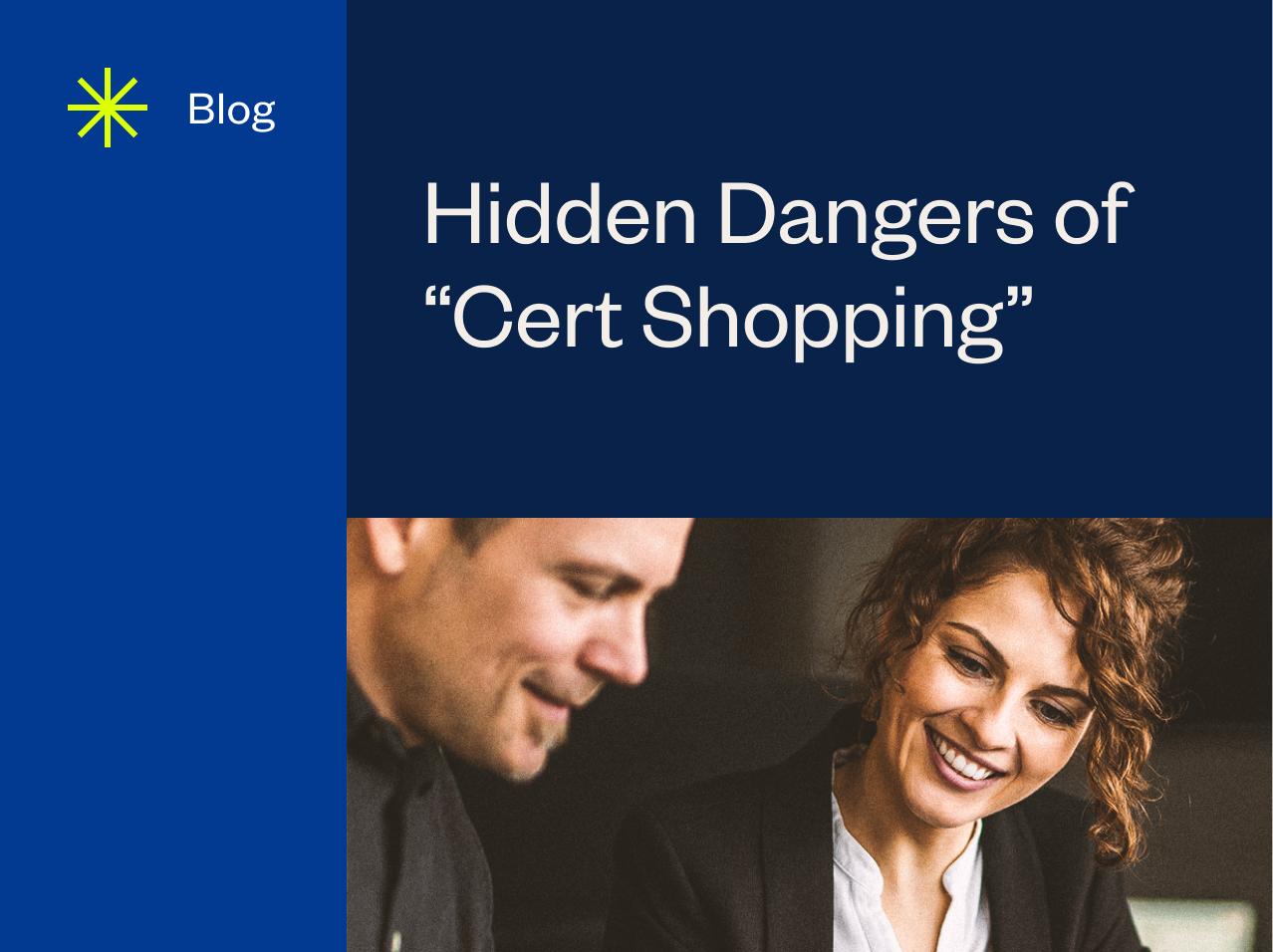Hidden Dangers of “Cert Shopping” for Compliance Assessors

Compliance isn’t just a contractual or regulatory requirement; it’s a cornerstone of trust, reputation, and operational excellence. As executives and managers evaluate compliance services, the temptation to “cert shop” or choose third-party assessors based solely on cost can be compelling. Making decisions based solely on price can pose significant risks. In this blog post, we will explore the perils of prioritizing cost over quality in compliance services.
Quality Over Quantity
The old saying “you get what you pay for” rings true when it comes to selecting an audit partner. While a cheaper assessor may seem like an attractive option, consider the quality of their work. Lower cost doesn’t always mean better value in the long run. Auditors who offer their services at a lower price point may lack the necessary expertise or thoroughness required for a comprehensive assessment. This can lead to overlooked vulnerabilities, ultimately putting your organization at risk.
The A-LIGN 2023 Compliance Benchmark Report revealed that over 30% of respondents had chosen not to do business with a vendor due to poor quality of assurance reporting. Prioritizing quality over quantity ensures that your organization receives the level of expertise and attention to detail necessary for a robust and effective assessment process.
Hidden Costs
While low-cost assessors may initially seem like a budget-friendly option, there may be hidden costs associated with their services. A cheaper service might not be as exhaustive, potentially missing critical vulnerabilities that could leave your organization exposed to security breaches. The 2023 Verizon Data Breach Investigation Report (DBIR) references crimes of opportunity (i.e., opportunistic exploit) as the number one driver for bad actors.
Addressing a security breach can be significantly more costly than the initial savings gained from choosing a cheaper auditor. The financial ramifications of a data breach can include regulatory fines, legal fees, damage control, and the loss of customer trust. Additionally, the cost of low-quality reporting should not be overlooked. Inaccurate or incomplete reporting can result in a lack of actionable insights and hinder your ability to make informed decisions to improve your cybersecurity posture effectively.
Reputational Harm
The reputation of your organization is everything. It is what differentiates you from your competitors and instills trust in your stakeholders and clients. Switching assessors solely based on price can have a negative impact on your reputation. When stakeholders, clients, or industry peers discover that you have chosen an auditor solely because they offered the cheapest price, it can lead to a perception of taking shortcuts or prioritizing cost over quality. A subpar assessment can erode trust as check-the-box assessments bring into question both the character and competence of your organization. It’s important to remember that the cost of reputational harm far outweighs any short-term cost savings gained.
Inconsistent Assessments
Switching audit providers frequently can lead to inconsistent evaluations. Each assessor has their own methodology, approach, and areas of focus. By constantly changing audit firms, it becomes challenging to track progress, identify recurring issues, and measure improvement over time. Consistency is key when it comes to cybersecurity assessments. Building a long-term relationship with a trusted partner allows for a more accurate and reliable evaluation of your organization’s security posture. By establishing continuity in the assessment process, you can effectively track your organization’s progress in addressing vulnerabilities and mitigating risks.
Reactive and Fragmented Compliance
Strategic compliance is about being proactive. It’s a process that consolidates audits and assessments, making them more efficient and less disruptive. The 2023 Compliance Benchmark Report found that 94% of respondents believe that consolidating their compliance obligations will save them time and money. However, many organizations are still taking a reactive approach to compliance. When time and budget constraints are in place, organizations are left to make less-than-ideal choices about their assessors. This leaves an opportunity for proactive organizations to get a competitive advantage by adopting a strategic approach to compliance.
Relationship and Partnership Building
Building a relationship with a trusted third-party assessor is invaluable. When you work with the same audit team over time, they become intimately familiar with your organization’s unique challenges, processes, and compliance needs. This deep understanding allows them to provide compliance aligned to you – tailored insights and recommendations specific to your organization’s circumstances. By building a long-term partnership, you gain trusted advisors who can guide you through the complex world of cybersecurity compliance. The best third-party compliance firms help you navigate changing regulations, provide strategic guidance, and ensure that your organization stays ahead of the curve in terms of security practices and compliance requirements.
Prioritizing Long-Term Value
While it is understandable to consider costs, it is equally crucial to prioritize the long-term value that a trusted and reliable auditor can bring to your organization. By focusing on quality, expertise, and consistency, you can safeguard integrity, security, and the ability to create value over time. Cybersecurity compliance is not a one-time checkbox exercise, it is an ongoing commitment to protect your organization and its stakeholders from ever-evolving threats. By choosing a reputable and experienced assessor, you are investing in the long-term success and resilience of your organization.
While optimizing cost is essential, it can’t be the only factor when selecting a compliance partner. The potential pitfalls of “cert shopping” can have wide-ranging implications, from financial repercussions to significant reputational damage. By focusing on long-term value, you can ensure that your organization’s integrity and security are protected. Strategic compliance isn’t just about adhering to standards and regulations; it’s about leveraging them for business growth and trust-building and creating lasting value for your organization.
